ALL’S FAIR IN LOVE AND WAR: Movie Reviews of Their Finest and Frantz by Howard Casner
Posted: April 24, 2017 | Author: Donald | Filed under: Uncategorized | Tags: Bill Nighy, Eddie Marsan, Ernst Stotzner, François Ozon, Frantz, Gaby Chiappe, Gemma Atherton, Jack Huston, Jeremy Irons, Lissa Evans, Lone Scherfig, Marie Gruber, Paula Beer, Philippe Piazzo, Pierre Niney, Rachel Sterling, Richard E. Grant, Sam Claflin, Their Finest | 707 Comments »For questions: hcasner@aol.com
First, a word from our sponsors: I am now offering a new service: so much emphasis has been given lately to the importance of the opening of your screenplay, I now offer coverage for the first twenty pages at the cost of $20.00. For those who don’t want to have full coverage on their screenplay at this time, but want to know how well their script is working with the opening pages, this is perfect for you. I’ll help you not lose the reader on page one.
Ever wonder what a reader for a contest or agency thinks when he reads your screenplay? Check out my new e-book published on Amazon: Rantings and Ravings of a Screenplay Reader, including my series of essays, What I Learned Reading for Contests This Year, and my film review
s of 2013. Only $2.99. http://ow.ly/xN31r
and check out my Script Consultation Services: http://ow.ly/HPxKE
Warning: SPOILERS
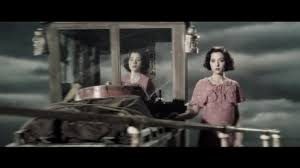 Their Finest is a movie about the making of a movie. But the creation of the film is done under rather extraordinary circumstances.
Their Finest is a movie about the making of a movie. But the creation of the film is done under rather extraordinary circumstances.
First, Hitler is raining bombs down on London during the blitz as the director is calling action.
Second, the film must be made to order and serve a certain propagandistic purpose.
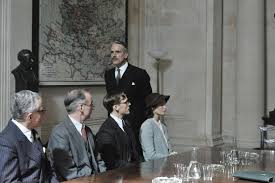 Their Finest, the title taken from a speech by Winston Churchill, opens at a British cinema with the audience watching a clunky and overly earnest film about working women giving their all to meet a war quota. Its intention inspirational, its result comedy unintentional.
Their Finest, the title taken from a speech by Winston Churchill, opens at a British cinema with the audience watching a clunky and overly earnest film about working women giving their all to meet a war quota. Its intention inspirational, its result comedy unintentional.
So the war ministry, headed with a marvelous cameo by Jeremy Irons as the minister, giving a rousing speech as if all involved are about to play rugby, wants a movie that is grounded in reality, but also has a message of hope (a seemingly contradictory request giving the dark days that have descended upon the empire).
Into this project steps one Catrin Cole (Gemma Atherton) who arrives thinking she’s applying for a secretarial position, but leaves as a screenwriter (well, someone has to write the women’s parts). She also leaves with a conflict: is her future to be a dutiful and supportive wife or an independent woman?
Since the movie is being made in 2017, the answer is fairly predictable.
Nevertheless, Their Finest is highly entertaining, never boring and ultimately moving. It’s a slickly made bit of stiff upper lip and the show must go on combined. I can’t see how anyone will be bored.
The most interesting aspect of the story, though, is not Catrin’s arc of mousy to independent, which is fairly standard, but how the movie manages to deal with the various slings and arrows thrown at the filmmakers and how they adapt and make due in trying to please all concerned, the funniest probably being a request from the Roosevelt administration that one of the central characters be an American (though Pearl Harbor has yet to happen). They select a flyer from the U.S. who has joined the RAF and who has become a popular hero. Unfortunately, though his credentials as a hero can hardly be challenged, no one bothered to find out whether his credentials as an actor were equally as good.
There are a couple of ironies here. The first is that the movie they make, The Nancy Starling, inspired by a story of two sisters, twins, who participated in D-Day, is only really surpassed by Their Finest due to technical superiority. In many ways, Their Finest, when all is said and done, may be aesthetically better than the movie within a movie the filmmakers make, but it’s little more than a movie grounded in realism that delivers a message of hope, something that the filmmakers in Their Finest tended to sneer at.
Second, though everyone cheers the idea that this breakout film is filled with working class heroes, the movie that really got everyone’s attention around the time in real life, Mrs. Miniver, is firmly focused on the upper class of the British caste system.
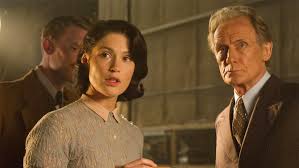 Still, as I said, the movie is highly enjoyable and it’s difficult to dislike anything that has Bill Nighy in it. And here he’s in top form as an aging actor who comes with a slice of ham, a prickly figure who has difficulty coming to terms with the idea that his days of being a matinee idol are over. He has a lovely moment at a gathering where he sings a sentimental song that can’t help but bring tears to the eyes.
Still, as I said, the movie is highly enjoyable and it’s difficult to dislike anything that has Bill Nighy in it. And here he’s in top form as an aging actor who comes with a slice of ham, a prickly figure who has difficulty coming to terms with the idea that his days of being a matinee idol are over. He has a lovely moment at a gathering where he sings a sentimental song that can’t help but bring tears to the eyes.
Also with Eddie Marsan as Nighy’s agent; Sam Claflin (Finnick Odair of The Hunger Games for those so inclined) as a fellow screenwriter and love interest; Jack Huston as Catrin’s cad of a boyfriend; Richard E. Grant as a producer; and Rachel Sterling (of The Detectorists) as a lesbian and assistant to the big bosses.
Gemma Atherton gives a strong performance as Catrin and she holds everything together rather well.
Directed by Lone Scherfig, who helmed the marvelous coming of age film, An Education, but has followed that up with solid, but uninspired fare like One Day. The screenplay is by Gaby Chiappe, one of Britain’s finer television writers, from the book Their Finest Hour and a Half, by Lissa Evans.
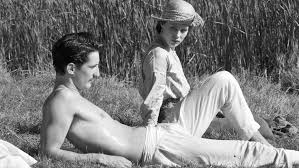 The title character in the new film Frantz is a young man who died in the trenches in World War One. His family is then visited by a Frenchman, Adrien, who claims to have been close friends with Frantz in Paris before the European conflict took place. The trio are at first reluctant to receive him, but as they get to know him, find solace in his memories.
The title character in the new film Frantz is a young man who died in the trenches in World War One. His family is then visited by a Frenchman, Adrien, who claims to have been close friends with Frantz in Paris before the European conflict took place. The trio are at first reluctant to receive him, but as they get to know him, find solace in his memories.
The direction is by Francois Ozon who wrote the screenplay with Philippe Piazzo. It’s inspired by an Ernst Lubitsch film, Broken Lullaby, which was in turn based on a play by Maurice Rostand, the son of Edmond Rostand, who wrote Cyrano de Bergerac.
But as it is in many Ozon films, nothing is quite what it seems and the story is driven by lies and deception, though often of the best intended kind.
Ozon may be a victim of the Hitchcock syndrome here. The master of suspense said he could never make Cinderella because everyone would expect there to be a dead body in the coach.
Ozon, in turn, has made many a film with gay central characters. So when Adrien claims to know Frantz, it seems as if he’s talking about in the Biblical way. It’s Ozon, what else could it mean?
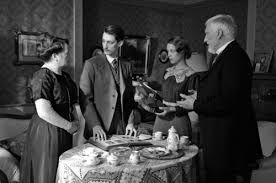 Well, something entirely different here and when the secret is revealed, it’s actually kind of a let down and a disappointment. The movie then takes some curious and not entirely uninteresting turns as it tries to decide if in life fantasy at times is more beneficial than truth. But it never really recovers from that central revelation.
Well, something entirely different here and when the secret is revealed, it’s actually kind of a let down and a disappointment. The movie then takes some curious and not entirely uninteresting turns as it tries to decide if in life fantasy at times is more beneficial than truth. But it never really recovers from that central revelation.
But I actually think there is a more serious problem and that is in the casting of Pierre Niney as Adrian. Actually, it’s not exactly the casting of the actor, but the casting of his mustache which, though popular at the time, is probably one of the more disastrous hirsute choices in film.
 For Niney, scrawny and large eyed as he is, the mustache makes him look like a young Salvador Dali, and is so distracting, it’s hard to take the character seriously. And then as time goes on, and Frantz’s fiancée Anna comes to look on him as a possible love interest, he has become something of a ninny such that rather than be unhappy when her love is not reciprocated, you feel as if she just dodged a bullet.
For Niney, scrawny and large eyed as he is, the mustache makes him look like a young Salvador Dali, and is so distracting, it’s hard to take the character seriously. And then as time goes on, and Frantz’s fiancée Anna comes to look on him as a possible love interest, he has become something of a ninny such that rather than be unhappy when her love is not reciprocated, you feel as if she just dodged a bullet.
With Paula Beer as Anna, Ernst Stotzner as Frantz’s father and Marie Gruber as his mother.
APARTMENT COMPLEXITY: High-Rise
Posted: May 25, 2016 | Author: Donald | Filed under: Uncategorized | Tags: Amy Jump, Ben Wheatley, Crash, Elizabeth Moss, Empire of the Sun, High-Rise, J.G. Ballard, Jeremy Irons, Kill List, Marie Antoinette, Metropolis, Monty Python, Sienna Miller, Sightseers, Snowpiercer, The Flies, Tom Hiddleston | 35 Comments »First, a word from our sponsors: I have just launched the indiegogo campaign for my short film 14 Conversations in 10 Minutes. Check it out http://ow.ly/SblO3005HHu. Below is a video sample of the short. Think about contributing (the lowest contribution is only $5.00). Please view and share anywhere and everywhere.
https://www.youtube.com/watch?v=1S0HyFTwqAI
I am now offering a new consultation service: so much emphasis has been given lately to the importance of the opening of your screenplay, I now offer coverage for the first twenty pages at the cost of $20.00. For those who don’t want to have full coverage on their screenplay at this time, but want to know how well their script is working with the opening pages, this is perfect for you. I’ll help you not lose the reader on page one.
Ever wonder what a reader for a contest or agency thinks when he reads your screenplay? Check out my new e-book published on Amazon: Rantings and Ravings of a Screenplay Reader, including my series of essays, What I Learned Reading for Contests This Year, and my film reviews of 2013. Only $2.99. http://ow.ly/xN31r
and check out my Script Consultation Services: http://ow.ly/HPxKE
Warning: SPOILERS
 The first third of High-Rise, the new movie based on the J.G. Ballard novel (he also gave us the autobiographical Empire of the Sun and the unautobiographical, we hope, Crash—no, not that Crash, Ballard gave us the one where people get turned on by auto accidents), has a nice quirky, what-the-hell sort of quality to its writing (Amy Jump, of Kill List and Sightseers) and directing (Ben Wheatley of ditto); they both seem to be having a great deal of fun, if nothing else.
The first third of High-Rise, the new movie based on the J.G. Ballard novel (he also gave us the autobiographical Empire of the Sun and the unautobiographical, we hope, Crash—no, not that Crash, Ballard gave us the one where people get turned on by auto accidents), has a nice quirky, what-the-hell sort of quality to its writing (Amy Jump, of Kill List and Sightseers) and directing (Ben Wheatley of ditto); they both seem to be having a great deal of fun, if nothing else.
Laing, a 30-something who likes to fall asleep on his balcony in the nude, moves into one of five of a set of state of the art apartment complexes that reach to the skies like the fingers of a hand. As he interacts with his neighbors, the conversation is realistic, yet off just a little. The actions of the characters are also realistic, yet off just a little. It almost feels like a kitchen sink version of a Monty Python sketch.
I more than suspect the whole thing is supposed to be allegorical with the high-rise an encapsulation of all the classes in England. Well, not quite, perhaps. The middle class live on the lower floors and the upper class live much higher, but the lower class seems restricted to a single building superintendent. While such dystopian allegories as Metropolis and Snowpiercer have no apparent middle class, High-Rise seems strangely void of a lower one. Read the rest of this entry »
Movie of Review BEAUTIFUL CREATURES by Howard Casner
Posted: February 20, 2013 | Author: Donald | Filed under: Uncategorized | Tags: Alden Ehrenreich, Beautiful Creatures, Eileen Atkins, Emma Thompson, Jeremy Irons, Margo Martindale, Richard LaGravenese, Viola Davis | 173 Comments »Beautiful Creatures, the new slough of despair, riddled with angst teenage film written and directed by Richard LaGravenese, is one of those movies that preaches against intolerance and bigotry and then makes cartoons out of every Christian in town, except for the one who’s black and therefore a true believer (stereotype much?). It’s also a teenage version of Bewitched in which a mortal falls in love with a witch (oh, all right, Christine O’Donnell, they are not witches, they are casters—happy now?), but with more adolescent ennui and existential dread. Finally, it’s also one of the myriad of films that we’re going to be plagued with (and I mean plagued) as various producers desperately try to fill the void that has been formed by the absence of the Twilight franchise.
I think it’s safe to say that Beautiful Creatures didn’t do a lot for me (I only went because I finally decided it had a better chance of working than that new Die Hard film—unfortunately, from what I’m hearing, I made the right choice).
To be fair, there is one marvelous scene near the beginning of Beautiful Creatures that did suggest the movie might actually go somewhere. Not anywhere great, mind you, I wasn’t that optimistic; but, you know, somewhere. In this scene, our hapless hero Ethan (played by Alden Ehrenreich, who has such an unnerving resemblance to Leonardo DiCaprio, he could play his younger brother) is put under a spell by caster Macon (Jeremy Irons—yes, that Jeremy Irons) and asked what he’s going to do with his life. It’s already been readily established that he is applying to every college more than a thousand miles away in order to get out of his podunk, one-horse town. But instead of going there, he instead finds himself spouting out that he’s going to college locally so he can take care of his father and end up teaching in town, making a disastrous marriage and cheating on his wife and drinking heavily and having a heart attack at age 52, etc., etc., until he dies at age 62 by hanging himself (but with the rather brilliant coup de grace that his body won’t be found for a few days).
But alas and alack, this going somewhere twas not to be, for a few scenes later, Macon and another character, Sarafine, who has taken over the body of the local religious bigot Mrs. Lincoln (played by Emma Thompson—yes, that Emma Thompson), have a lengthy pax de duex in a church that goes on and on…and on. And at this point, this very point, the movie crashes and burns and, to mix metaphors, gets buried so deep, not even George Romero could resurrect it.
And speaking of Jeremy Irons and Emma Thompson, not to mention Viola Davis and Eileen Atkins and Margo Martindale (yes, that David, Atkins and Martindale), why is it in England when they use their great actors and award winners for escapist fare, they give them movies like The Lord of the Rings, Harry Potter and the James Bond films, but in the U.S. they give them stuff like…like…well, like this?
But you have to hand it to them. All the actors are game and they play it all as if it were written by the bard himself (one doesn’t know whether to give them credit where credit is due for that, or just sit down and weep tears of Dido). At any rate, it hardly matters. Most of the time one just sits there not entranced by their performances, but just trying to figure out why they would make a movie like this.
Yeah, I don’t think Beautiful Creatures did a lot for me.












